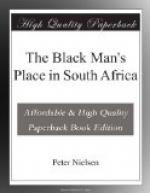The foregoing argument shows that the alleged mental superiority of the European cannot be due to constant use or education, so that it now becomes necessary for those who maintain that it nevertheless exists to prove, not only that the white man’s intellectual capacity is now superior but to prove also that from the beginning it has always been stronger and better than that of the African Native, or, in other words, those who believe that the white race has inherent mental superiority must prove innate inferiority in the mental make-up of the Native.
There is a more or less indefinite notion abroad that the Bantu languages, as compared with those of Europe, are but poor and ineffective vehicles for the conveyance of abstract ideas, wherefore the capacity to form and entertain such ideas may be taken to be innately inferior in the Native brain. That the language of a people embodies, so to speak, in objective form the intellectual progress made by it is certainly true, and it will be well, therefore, to state briefly the actual and potential value of the Native speech as compared with that of the whites.
The living and the dead languages of the world have been classified by philologists into three main types of linguistic morphology; the isolating, like Chinese; the agglutinative, like Turkish and Bantu, and the inflective, like Latin. It was customary not long ago to look upon these three types as steps in a process of historical development, the isolating representing the most primitive form of speech at which it was possible to arrive, the agglutinative coming next in order as a type evolved from the isolating, and the inflective as the latest and so-called highest type of all. But since the matter has been carefully studied it has been admitted that there is no satisfactory evidence for believing in any evolution of linguistic types. English is now considered to be an isolating language in the making while Chinese is cited by authoritative European scholars as being a language which with the simplest possible means at its disposal can express the most technical or philosophical ideas with absolute freedom from ambiguity and with admirable conciseness and direction.[16]




